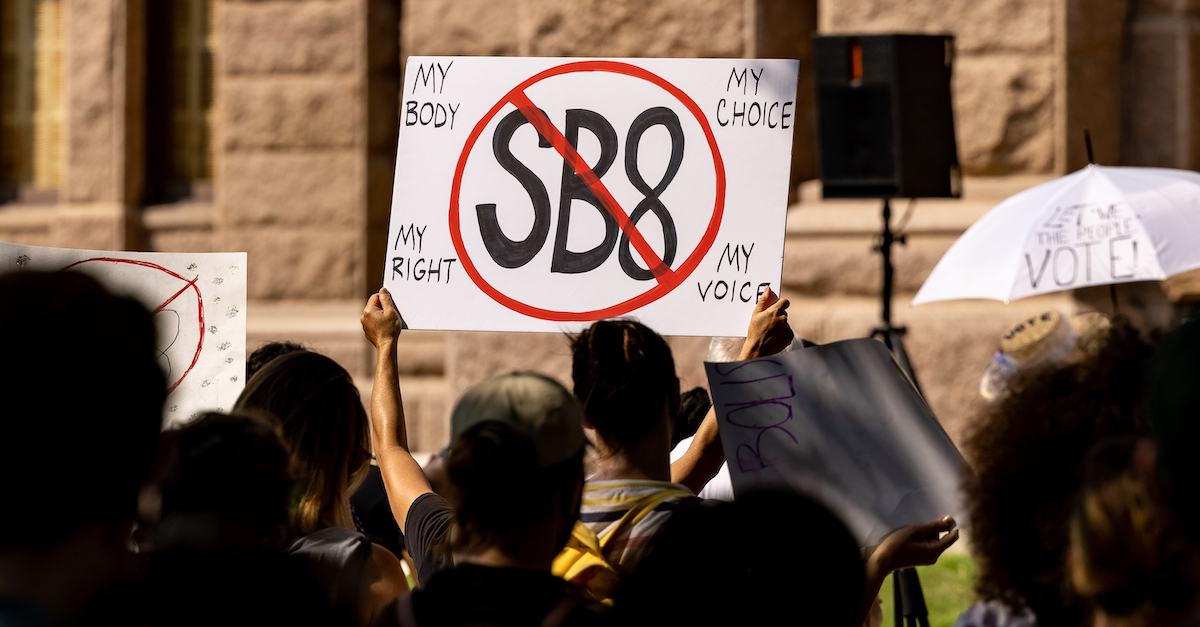
Abortion rights activists rallied at the Texas State Capitol on September 11, 2021 in Austin, Texas.
Effectively hobbling a challenge to the Lone Star State’s anti-abortion law, the Texas Supreme Court issued a ruling on Friday letting state medical officials off the hook in a lawsuit opposing the statute.
Described by its opponents as a “bounty hunting” scheme, SB 8 creates a private cause of action and monetary reward incentivizing private citizens to bring lawsuits against any person who “aids or abets the performance or inducement of an abortion” after fetal cardiac activity is detected—usually about six weeks into pregnancy.
Since the enforcement mechanism circumvents the state, mostly conservative judges have rejected legal challenges seeking to hold the statute unconstitutional in a post-Roe v. Wade era. The conservative-dominated Supreme Court demurred, tossing most of one lawsuit captioned Whole Woman’s Health v. Jackson last December. Justice Neil Gorsuch cited the narrow jurisdiction of federal courts in his ruling.
The high court did, however, allow a narrow part of the case to proceed against the Texas Medical Board and other state licensing officials, seeking to prevent them from taking disciplinary actions against doctors and other health professionals who provide abortion care in violation of SB 8.
The Fifth Circuit certified a question asking the Texas Supreme Court whether officials have the authority to revoke licenses for violations of SB 8.
On Friday, Texas’s highest court ruled that they do not, leaving out the remaining state actors available to stand in as a defendant in challenging the law.
“Senate Bill 8 provides that its requirements may be enforced by a private civil action, that no state official may bring or participate as a party in any such action, that such an action is the exclusive means to enforce the requirements, and that these restrictions apply notwithstanding any other law,” Justice Jeffrey Boyd wrote in a 23-page ruling. “Based on these provisions, we conclude that Texas law does not grant the state-agency executives named as defendants in this case any authority to enforce the Act’s requirements, either directly or indirectly.”
Julia Kaye, a staff attorney for the American Civil Liberties Union’s Reproductive Freedom Project, declared: “The courts have once again failed Texans.”
“This is another devastating injustice, and people will continue to be denied the basic human dignity of being able to control their own body,” Kaye wrote in a statement. “Some have been able to overcome this cruel law through the extraordinary support of abortion funds and the reproductive rights and justice movement to get abortion care very early in Texas or travel out of state. But too many others have been denied abortion care altogether, and the brunt of this horrific law has fallen on the most marginalized people, including people of color and people with the fewest resources. The public cannot stand by while extremist politicians and cowardly courts strip away our civil rights.”
The ACLU says that the ruling means SB 8 will remain law of the land in Texas for the foreseeable future, and it notes copycat statutes proliferate across the nation, with legislation introduced in Alabama, Arizona, Florida, Idaho, Maryland, Minnesota, Missouri, Ohio, and Wisconsin. One is likely to pass in Oklahoma by the end of the month, according to the group.
Other groups involved in the litigation include Center for Reproductive Rights, Planned Parenthood Federation of America, the Lawyering Project, and Morrison & Foerster LLP.
Nancy Northup, the president and CEO of the Center for Reproductive Rights, called the decision bodes a “moment of crisis not only for reproductive rights but for our justice system and the rule of law.”
“With this ruling, the sliver of this case that we were left with is gone,” Northup wrote. “An unconstitutional ban on abortion after six weeks continues unchecked in the state of Texas. The courts have allowed Texas to nullify a constitutional right. We will continue to do everything in our power to right this wrong.”
Read the ruling below:
(Photo by Jordan Vonderhaar/Getty Images.)
Have a tip we should know? [email protected]